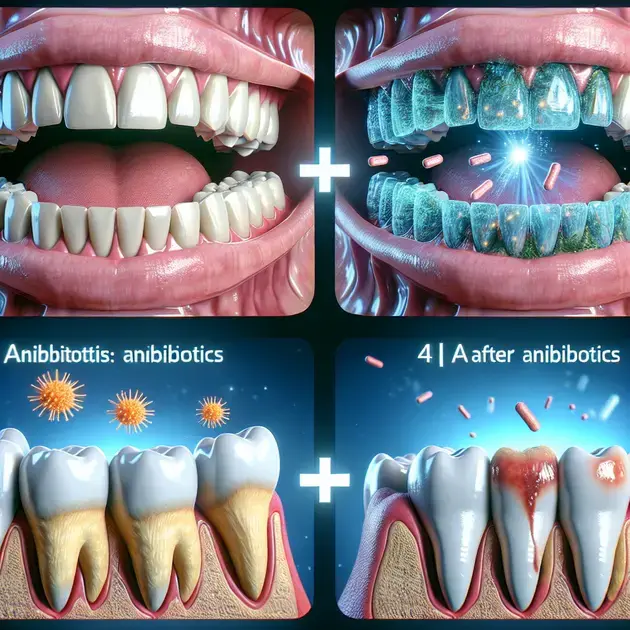Are you looking for effective medication for periodontitis? Look no further! This comprehensive guide will provide you with all the information you need to understand the best treatment options available for this common dental issue.
Periodontitis is a serious condition that affects the gums and can lead to tooth loss if left untreated. With advancements in dental medicine, there are now various effective medications that can help combat this disease and improve your oral health. Let’s explore the most recommended treatments in this detailed guide.

Introduction to Periodontitis Medication
Periodontitis is a severe gum infection that can lead to tooth loss if not properly treated. Medication plays a crucial role in managing and treating periodontitis, in combination with professional dental care. Understanding the available medications for periodontitis is essential for effective treatment.
Step-by-Step Guide to Understanding Periodontitis Medication:
1. Consultation with a Periodontist: The first step in understanding periodontitis medication is to consult with a periodontist, a dentist specialized in the prevention, diagnosis, and treatment of gum diseases. They will evaluate your condition and recommend the most appropriate medication.
2. Antibiotics: Antibiotics are commonly prescribed to treat periodontitis to control bacterial infections. Examples of antibiotics include doxycycline and minocycline. Your periodontist may recommend taking them orally or applying them directly to the infected gums.
3. Antiseptic Mouthwash: Antiseptic mouthwashes containing chlorhexidine may be prescribed to reduce plaque and prevent the growth of bacteria in the mouth. Using a mouthwash as part of your daily oral hygiene routine can be beneficial in managing periodontitis.
4. Anti-Inflammatory Medication: Nonsteroidal anti-inflammatory drugs (NSAIDs) such as ibuprofen may help reduce inflammation and pain associated with periodontitis. Your periodontist can advise on the appropriate dosage and duration of use.
5. Follow-Up Appointments: It is crucial to attend regular follow-up appointments with your periodontist to monitor the effectiveness of the medication and make any necessary adjustments to your treatment plan.
Understanding Periodontitis Treatment Options
Effective treatment of periodontitis involves a combination of professional dental care, good oral hygiene practices, and, in some cases, medication. Understanding the treatment options available for periodontitis can help you make informed decisions about your oral health.
Step-by-Step Guide to Understanding Periodontitis Treatment Options:
1. Scaling and Root Planing: One of the primary treatments for periodontitis is scaling and root planing, a deep cleaning procedure that removes plaque and tartar from the teeth and roots. This can help reduce inflammation and promote gum healing.
2. Surgical Procedures: In advanced cases of periodontitis, surgical interventions such as flap surgery or bone grafting may be necessary to restore damaged gum tissue and bone structure. Your periodontist will discuss the most suitable surgical options for your condition.
3. Laser Therapy: Laser therapy is a minimally invasive treatment option for periodontitis that can target and eliminate bacteria from infected gum pockets. It promotes faster healing and reduces the need for traditional surgery in some cases.
4. Maintenance and Home Care: Maintaining good oral hygiene practices at home, such as brushing twice a day, flossing daily, and using an antiseptic mouthwash, is crucial for managing periodontitis. Regular professional cleanings are also essential for long-term oral health.
5. Lifestyle Changes: Making lifestyle changes such as quitting smoking, eating a balanced diet low in sugars, and managing stress can contribute to better periodontal health and improve the effectiveness of treatment.
Exploring the Best Medications for Periodontitis
When exploring the best medications for periodontitis, it is essential to consider the effectiveness, safety, and convenience of the options available. Working closely with your periodontist to determine the most suitable medication for your specific needs is key to successful treatment.
Step-by-Step Guide to Exploring the Best Medications for Periodontitis:
1. Research and Consultation: Start by researching different medications commonly used for periodontitis and consult with your periodontist to discuss the benefits and potential side effects of each option.
2. Personalized Treatment Plan: Your periodontist will create a personalized treatment plan tailored to your individual needs, which may include a combination of medications such as antibiotics, antiseptic mouthwashes, and anti-inflammatory drugs.
3. Prescription Medications: Your periodontist may prescribe prescription medications to manage periodontitis effectively. Follow the instructions provided and inform your dentist of any allergies or existing medical conditions.
4. Monitoring and Adjustment: Regular monitoring of your response to medication is essential to ensure its effectiveness. Be proactive in reporting any concerns or changes in your oral health to your periodontist for timely adjustments to your treatment plan.
5. Ongoing Oral Care: In addition to medication, maintaining a consistent oral care routine is crucial for managing periodontitis. Stay committed to good oral hygiene practices and attend scheduled dental appointments for optimal results.

**The Role of Antibiotics in Periodontitis Treatment**
Antibiotics in Periodontitis Management
When it comes to treating periodontitis, antibiotics play a crucial role in combating the bacterial infection that leads to gum disease. These medications are often prescribed by dentists along with other treatments such as scaling and root planing to effectively address the underlying cause of periodontitis. Antibiotics work by either killing the harmful bacteria or inhibiting their growth, helping to reduce inflammation and promote healing in the gums.
It is important to note that antibiotics should always be used in conjunction with professional dental care and good oral hygiene practices. They are not meant to be a standalone treatment for periodontitis but rather a complementary therapy to enhance the overall effectiveness of the treatment plan. Dentists carefully select the appropriate antibiotic based on the specific bacteria present in the patient’s mouth and their medical history to ensure optimal outcomes.
While antibiotics can be highly effective in treating periodontitis, it is essential to follow the prescribed dosage and duration to avoid antibiotic resistance and potential side effects. Patients should also inform their healthcare providers about any allergies or adverse reactions to antibiotics to prevent complications during treatment. Overall, incorporating antibiotics into the treatment regimen for periodontitis can significantly improve oral health outcomes and prevent disease progression.
In summary, antibiotics play a vital role in the comprehensive management of periodontitis by targeting the underlying bacterial infection that causes gum disease. When used in combination with professional dental care and good oral hygiene practices, antibiotics can help reduce inflammation, promote healing, and prevent disease recurrence. Patients should follow their dentist’s recommendations closely to ensure the safe and effective use of antibiotics as part of their periodontitis treatment plan.
Benefits of Antibiotics in Periodontitis Treatment
Antibiotics offer several benefits in the treatment of periodontitis, including their ability to target and eliminate the specific bacteria responsible for gum disease. By reducing the bacterial load in the mouth, antibiotics help control the infection, alleviate symptoms such as swelling and bleeding gums, and support the healing process. Additionally, antibiotics can reach areas of the gums that may be difficult to clean through regular oral hygiene practices, providing a more comprehensive treatment approach for periodontitis.
Another significant benefit of antibiotics in periodontitis treatment is their role in preventing disease progression and potential complications. By addressing the underlying cause of gum disease, antibiotics help stabilize the condition, reduce the risk of tooth loss, and improve overall oral health outcomes. When used in conjunction with other periodontal therapies, antibiotics can enhance the effectiveness of the treatment plan and promote long-term success in managing periodontitis.
Furthermore, antibiotics offer a non-invasive and relatively simple treatment option for patients with periodontitis, particularly in cases where surgical intervention may not be necessary. By taking antibiotics as prescribed by their dentist, patients can experience improvements in their gum health, reduced inflammation, and better overall quality of life. Overall, the benefits of incorporating antibiotics into the treatment of periodontitis are significant and contribute to better oral health outcomes for patients.
It is important for patients to work closely with their dentist to determine the most appropriate antibiotic therapy for their specific case of periodontitis and to follow the prescribed treatment plan diligently. By understanding the benefits of antibiotics in periodontitis treatment and actively participating in their oral care, patients can achieve optimal results and maintain healthy gums in the long term.
**
Conclusion
**
Antibiotics are essential in the treatment of periodontitis, significantly aiding in combating bacterial infections that cause gum disease. When prescribed alongside other dental treatments, such as scaling and root planing, antibiotics effectively target the root cause of periodontitis by eliminating harmful bacteria or inhibiting their growth. It’s crucial to understand that antibiotics should complement professional dental care and oral hygiene practices, rather than serve as a standalone solution.
For optimal outcomes, dentists carefully select antibiotics based on the patient’s specific oral bacteria and medical history. Adhering to the prescribed dosage and duration is vital to prevent antibiotic resistance and adverse reactions. By incorporating antibiotics into the treatment plan, patients can markedly improve their oral health, reduce inflammation, aid in healing, and deter disease progression.
Moreover, antibiotics offer multiple benefits in periodontitis treatment. They target and eradicate the bacteria responsible for gum disease, helping control infections, alleviate symptoms like gum swelling and bleeding, and facilitate the healing process. Additionally, antibiotics reach inaccessible gum areas, enhancing the overall effectiveness of treatment. By stabilizing the condition and reducing the risk of tooth loss, antibiotics also prevent disease progression and complications, promoting improved oral health outcomes.



